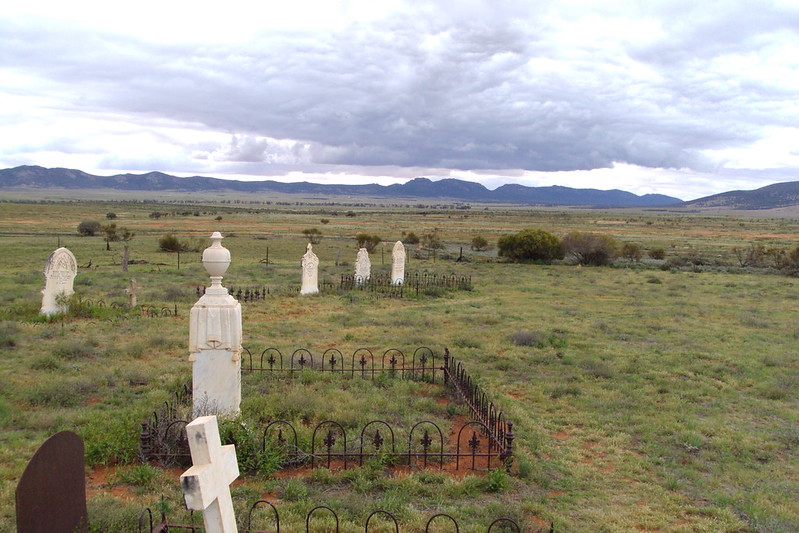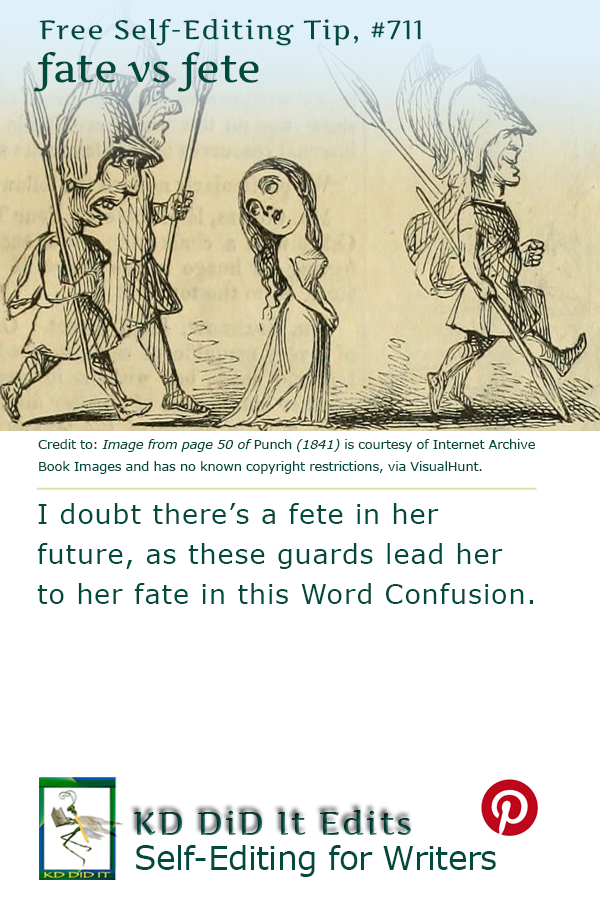Revised as of 14 April 2021
If I remember that fate and fete are heterographs (a subset of homophone), then I can remember that they are pronounced the same. It’s my one problem with this Word Confusion pair.
I do get excited thinking about a fete. After all, who doesn’t love a party!? It’s what happens at the party that makes me wonder if I’m fated to get drunk…sigh…
Word Confusions…
…started as my way of dealing with a professional frustration with properly spelled words that were out of context in manuscripts I was editing as well as books I was reviewing. It evolved into a sharing of information with y’all. I’m hoping you’ll share with us words that have been a bête noir for you from either end.
If you found this post on “Fate versus Fete” interesting, consider tweeting it to your friends. Subscribe to KD Did It, if you’d like to track this post for future updates.
| Fate | Fete |
|---|---|
| Credit to: Apple Dictionary.com; Dictionary.com: fate and fete; Oxford Living Dictionaries: fate and fete | |

Wilson Cemetery in the Flinders Ranges, South Australia, by denisbin is under the CC BY-ND license, via VisualHunt. — A town founded in 1881 for wheat farmers fated for failure. |

Weihnachtsmarkt in Berlin at Kaiser Wilhelm Memorial Church is by Sergey Galyonkin and is under the CC BY 2.0 license, via Flickr. — We feted our way through all the drinking stalls at this beautiful church fete. |
| Part of Grammar: | |
| Noun; Verb, transitive
Plural for the noun and third person present verb: fates |
Noun; Verb, transitive
Plural for the noun and third person present verb: fetes, fêtes Alternate spelling: fête |
| Noun: The development of events beyond a person’s control, regarded as determined by a supernatural power
[Greek & Roman Mythology; the Fates] The three goddesses who preside over the birth and life of humans
The universal principle or ultimate agency by which the order of things is presumably prescribed
That which is inevitably predetermined
A prophetic declaration of what must be Death, destruction, or ruin Verb, transitive: Be destined to happen, turn out, or act in a particular way To predetermine, as by the decree of fate
|
Noun: [Chiefly North American] A celebration, holiday, or festival
A festive celebration or entertainment A religious feast or festival Verb, transitive: Honor or entertain someone lavishly |
| Examples: | |
| Noun: Fate decided his course for him. His injury is a cruel twist of fate. He suffered the same fate as his companion. The guards led her to her fate. Each person’s destiny was thought of as a thread spun, measured, and cut by the three Fates, Clotho, Lachesis, and Atropos. To be without chocolate is a fate worse than death. Fate decreed that they would never meet again. Death is our ultimate fate. The oracle pronounced their fate. Verb, transitive: He was fated to lose the game. Jeanne d’Arc was fated to be the savior of her country. Could the unearthing of that page really have fated this destiny for us? Faith is just one of those characters who are fated to die. It was one of those competitions we were fated to win. |
Noun: The Fourth of July is a great American fete. It used to be part of the church fête but we decided to have a separate flower show in its own right so it could be a bigger event. The fête raised more than £1,600 for books for the new library. The ball was the greatest fête of the season. It was a grand fete lasting several days in honor of a saint. It was a lot of work for Chris, arranging this fete. Verb, transitive: On his death last February, Miller was fêted as 20th-century America’s greatest dramatist. During the dot-com boom, software engineers became celebrities, fêted by the press. Each of the boys was awarded the Purple Heart for gallantry, and their parents were fêted by President Franklin D. Roosevelt at the White House. After the UN meeting the African leaders were fêted by US businessmen. |
| Derivatives: | |
| Adjective: fatal, fateful Adverb: fatefully Noun: fatefulness |
Adjective: unfeted |
| History of the Word: | |
| Late Middle English, from the Italian fato or (later) from its source, the Latin fatum meaning that which has been spoken, which is from fari meaning speak. | Late Middle English, in the sense of festival, fair, from the French, is from the Old French feste. |
C’mon, get it out of your system, bitch, whine, moan…which words are your pet peeves? Also, please note that I try to be as accurate as I can, but mistakes happen or I miss something. Email me if you find errors, so I can fix them…and we’ll all benefit!
Satisfy your curiosity about other Word Confusions by exploring the index. You may also want to explore Formatting Tips, Grammar Explanations, and/or the Properly Punctuated.
Pinterest Photo Credits:
Image from page 50 of Punch, <https://visualhunt.com/f2/photo/14767238044/18e6b1d7bf/>, 1841, is courtesy of Internet Archive Book Image and has no known copyright restrictions, via VisualHunt.


